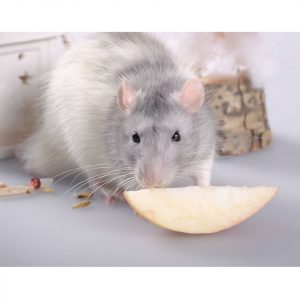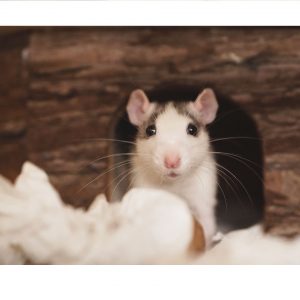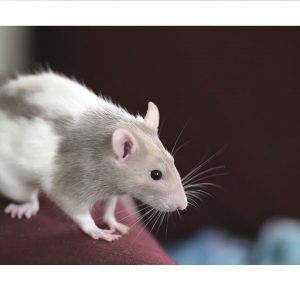Rats are opportunistic omnivores, which means they eat both meat and plants. They will eat practically anything if offered or if they are curious enough, and that includes baby food.
Baby food is an excellent and safe occasional treat for your pet rat. Not only that, it’s a wonderful reward for pet rat training. Just be careful with the amount of sugar and salt in the baby food.
With that said, not all baby foods are suitable.
Let’s find out what baby food you should add to your grocery list and when to serve them.
Healthy And Balanced Pet Rat Diet (With Baby Food)
Before discussing the types of baby food to feed your rats, let’s discuss your pet’s nutritional requirements first.
Although rats can survive on almost anything, you can’t just feed them pet food and hope for the best.
Like other animals, rats need a specific diet for optimum nutrition and health or may develop nutrient imbalance and diet-related diseases.
For instance, too much protein can cause skin allergies and spots. Eating foods high in sugar and fat can lead to obesity.
Nutritionally-balanced rat pellets or kibbles with more than 14% protein are the recommended diet for rats. Growing pups (under 4 months) and pregnant rats may require at least 24% protein.
Components of a healthy balanced diet for rats:
| 70% | Nutritionally complete, age-specific commercial rat pellet or lab block | Oxbow, Mazuri, Envigo Teklad |
| 20% | Mix of veggies and fruits | Peas, carrots, cucumbers, potatoes, broccoli, tomatoes, bananas, watermelon, grapes, cherries, strawberries, plum |
| 5% | Treats | baby food, yogurt drops, dry oats, whole wheat pasta, whole nuts, vegetable sticks, cooked meat, dried fruits |
High-quality pellets or lab blocks must contain:
- 75-80% carbs
- 14-16% protein
- 4-6% fat
Suggested daily dietary intake using commercial rat food:
- 15 g of food/rat for growing rats and adults
- 15-20 g of food/rat during pregnancy
- 20-40 g of food/rat during lactation
Some pet rats can become picky eaters, so it’s essential to introduce them to various food when they are younger. It’s also safe to feed your rat human food in moderation.
What Baby Foods Do Rats Like And Can Eat?
Most rats love baby food, and it’s safe to give them as treats. These treats can help you bond faster with your pets and are also helpful during training.
Baby foods such as Gerber puffs or rice crispies can be used as treats. Commercial baby foods are formulated for infants, so they are safe for the delicate digestive system of rats.
Introducing baby food to your pet rat involves a bit of trial and error. Experiment with different varieties to see what your rats prefer.

Many pet owners have had success with fruity baby food, such as apple sauce, bananas, and blueberry. You can also try meat baby food made of chicken, turkey, and ham.
Baby food purees come in pouches, jars, or plastic tubs and are categorized into three different stages:
Stage 1: Finely pureed.
These are purees with a single ingredient. The consistency of the puree is thin and smooth, making it easy to swallow.
You can start introducing single-ingredient baby food to your rat so it would be easier to identify any potential allergies to food.
Examples from popular brands
- Beech-Nut Naturals Stage 1
- Plum Organics Stage 1
- Gerber Organic 1st Foods
- Happy Baby Organics Clearly Crafted Stage 1
Stage 2: Thicker consistency
This baby food contains a combination of food that are mashed or strained. Most rats enjoy stage 2 baby food made of bananas, apples, and squash.
Examples from popular brands
- Parent’s Choice Baby Food
- Beech-Nut Naturals Stage 2
- Beech-Nut Harvest Dinners Stage 2
- Earth’s Best Corn and Butternut Squash
- Cerebelly Organic Stage 2
Stage 3: Contain food chunks
These combination purees have more texture and contain small chunks of food. Expose your rat to several varieties of baby food to make them more accepting of new food as they age.
Examples from popular brands
- Gerber 3rd Foods Mealtime for Baby
- Beech-Nut Naturals Stage 3
- Earth’s Best Chunky Orchard Fruit
- Beech-Nut Naturals Superblends Stage 3
How Much Baby Food Should I Feed My Pet Rat?
Baby food should be given to healthy adult rats at least 2 to 3 times a week.
You can provide more to sick and aged rats, but it shouldn’t be your primary source of nutrients.
Rats will pick sweet treats and high-fat food over their essential mix, so make sure they have eaten their daily base diet before you give them treats. Baby food can be healthy, but too much is not.
Excessive consumption of sugary treats can lead to dental caries and obesity.
Studies revealed that obese rats have a shorter life span and poor breeding capacity. Tumor growth is also more common in obese rats.
Can I Feed My Rat Baby Food Every Day?
Baby food is not a suitable alternative to food specially made for rats. Giving your rats baby food every day may cause your rat to reject their healthy kibbles.
While high-quality, natural baby foods are available today, many are ultra-processed and contain added or free sugars.
A 2021 study found that almost 40% of baby food products in European countries contain at least one sugar-contributing ingredient.
More than 1/3 of the products with “no added sugars” claim on their labels contain free sugars or fruit and veggie purees.
Processed fruits are considered healthier than added/free sugars, but the process of pureeing releases sugar that may have the same effects as other sugar forms.
Baby Food for Older Rats
As rats grow older, they may develop dental problems and have trouble eating blocks and seeds.
They may also have weaker back legs and difficulty standing up or holding their food. Some may lack appetite and lose a lot of weight.
You can feed older rats soft food, such as baby food, to help them gain weight. Alternatively, you can add baby food to a ready-made or homemade wet meal.
- Canned food for senior dogs and cats
- Feast egg food (bird feed)
- Soakable mixtures or porridge
The ready-made soakable mix may contain flaked rice, flaked buckwheat, vegetable flakes, and bulghur wheat, among others.
This nutritionally balanced food can replace the rat’s regular dry mix. You may add Nutrical to the wet meal to give your rats a calorie boost.
Another way to feed your elderly rat is to grind their pellets and add baby food, soy milk, or cooked oats. An elderly rat’s diet should contain less protein at around 12%.
Baby Food for Sick Rats
As sick rats may lack the strength to eat solid food, you may offer soft sugary foods to tempt their appetite. You may need to syringe feed your rat if it’s not drinking or eating on its own.
Sick rats may have any baby food as long as it is low in sugar, salt, and preservatives. Too much baby food can cause diarrhea in sick rats.
If you are looking for a particular ingredient (carrot or pumpkin), that ingredient should be on top of the list. When choosing organic baby food, make sure they are USDA certified.
If your pet rat is obese, senior, and has an underlying medical condition, consult your veterinarian to determine your pet’s specific daily dietary requirements.
Baby Foods to Avoid
When choosing baby food in the market, read the labels closely.
Check for the ingredients list and ensure the product is not high in sugar and salt.
Avoid baby food with many additives, such as artificial colors, nitrates and nitrites, and other preservatives.
Heavy metals such as arsenic, cadmium, lead, and mercury may contaminate baby food products.
Heavy metals are naturally found in the soil and water. As plants grow, they absorb these metals and make their way into our food.
The FDA (check the information here) has been working hard to remove products that do not meet the standards for baby food safety.
If you see certain brands that were recalled for contamination, remember that not all products from the same brand are contaminated.
Check the brands’ websites for the list of products that have been recalled.
FAQ
How many pellets should a rat have?
Many pet owners believe that rats should have free access to pellets, while some vets recommend feeding pellets twice a day.
It depends on your pet’s feeding behavior. Some rats tend to overeat when they are bored, while others stop when they are full.
About 2 to 3 blocks per rat, supplemented by veggies and fruits, are enough for your pet’s daily needs.
To know more about food quantities, check out our article on How Much Food To Feed Your Pet Rats!
Can rats eat baby cereal?
Rats can tolerate cheerios, puffed rice, rice crispies, and other baby cereals.
When feeding store-bought food to your rats, choose foods with no artificial colors, flavors, and sweeteners.
Baby foods are considered supplemental foods or treats and should only be fed occasionally.
Can rats eat yogurt?
Yes, rats love yogurts! Low-fat, low-sugar yogurts with live cultures benefit rats when eaten occasionally.
Yogurt drops can also be used as a training aid. You can make yogurt drops using a dehydrator.
Our Can I Feed My Rat Yogurt article gives many recommendations, along with how to make your yogurt drops. Be sure to check it out!




